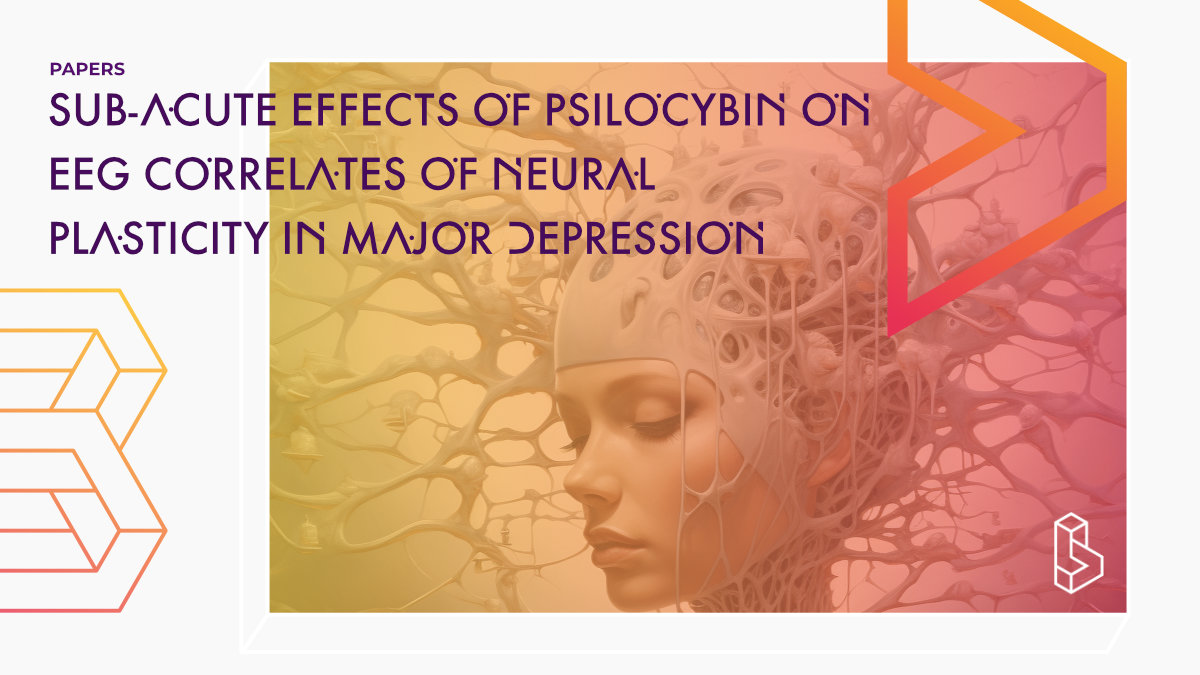This double-blind, placebo-controlled, within-subject study (n=19) involved individuals with major depressive disorder (MDD). It investigated the effects of a single dose of psilocybin on electroencephalographic (EEG) correlates of neuroplasticity and depression symptoms. The results showed that EEG theta power doubled in amplitude two weeks after psilocybin administration. This increase was correlated with improvements in depression symptoms, suggesting that psilocybin may produce sustained changes in brain neuroplasticity and have antidepressant effects. Note that the improvement in depression scores was not significant vs placebo.
Abstract of Sub-acute effects of psilocybin on EEG correlates of neural plasticity in major depression
“Background: Evidence suggests that serotonergic psychedelics (e.g. psilocybin), have rapid-acting and long-lasting antidepressant effects after a single dose. However, the mechanism underlying these effects remain unclear. One proposed mechanism is that these drugs promote neuroplasticity. However, this has not been conclusively demonstrated in humans.
Aims: We hypothesized that relative to placebo, psilocybin would: (1) increase electroencephalographic (EEG) correlates of neuroplasticity, (2) reduce depression symptoms, and (3) changes in EEG would correlate with improvements in depression.
Methods: In this double-blind, placebo-controlled, within-subject study, individuals with major depressive disorder (MDD; n = 19) were administered placebo followed by psilocybin (0.3 mg/kg) in a fixed order (placebo, followed by psilocybin 4 weeks later). EEG indices of neuroplasticity (tetanus-induced long-term potentiation) as assessed via auditory evoked theta (4–8 Hz) power and measures of depression (GRID Hamilton Rating Scale for Depression-17 (GRID-HAM-D-17)) were measured at several time-points after placebo and psilocybin (24 h and 2 weeks after each session).
Results: EEG theta power doubled in amplitude 2 weeks after a single psychedelic dose of psilocybin but not after placebo. Further, improvements in depression symptoms 2 weeks after psilocybin were correlated with increases in theta power.
Conclusions: The increased theta power observed represents evidence of sustained changes in the brain following psilocybin. Given the correlation with enhancement in depressive symptoms, changes in theta may represent an EEG biomarker of the sustained effects of psilocybin, and may shed light on potential mechanisms of psilocybin’s antidepressant effect. Taken together, these results complement the emerging notion that psilocybin, and perhaps other psychedelics, can produce long-term alterations in neuroplasticity.”
Authors: Patrick D. Skosnik, Jordan Sloshower, Jeffrey Guss, Robert Krause, Ryan M. Wallace, Monnica T. Williams, Sara Reed & Matthew D. Skinta
Summary of Sub-acute effects of psilocybin on EEG correlates of neural plasticity in major depression
Recent studies have suggested that psilocybin, a compound found in various genera of mushrooms, may have therapeutic effects in depression, anxiety, substance use, smoking cessation, migraine, and other disorders.
Psilocybin therapy produces acute and sustained antidepressant effects. Several cognitive/behavioral and neurobiological mechanisms have been proposed to explain these effects, including increased cognitive flexibility, decreased experiential avoidance, increased connectedness, relaxation and revision of high-level beliefs, and emotional breakthrough.
Find this paper
https://doi.org/10.1177/02698811231179800
Paywall | Google Scholar | Backup | 🕊
Cite this paper (APA)
Skosnik, P. D., Sloshower, J., Safi-Aghdam, H., Pathania, S., Syed, S., Pittman, B., & D’Souza, D. C. (2023). Sub-acute effects of psilocybin on EEG correlates of neural plasticity in major depression: Relationship to symptoms. Journal of Psychopharmacology, 02698811231179800.
Study details
Compounds studied
Psilocybin
Topics studied
Treatment-Resistant Depression
Depression
Study characteristics
Original Re-analysis
Placebo-Controlled
Double-Blind
Within-Subject
Participants
19
Humans
Authors
Authors associated with this publication with profiles on Blossom
Jordan SloshowerJordan Sloshower is a research fellow in addiction psychiatry at Yale University. His research and clinical interests focus on therapeutic applications of psychedelic substances and he is currently an investigator and therapist in two clinical trials of psilocybin-assisted therapy in the treatment of major depressive disorder (MDD).
Institutes
Institutes associated with this publication
Yale UniversityThe Yale Psychedelic Science Group was established in 2016.
Heffter Research Institute
The Heffter Research Institute has been advancing psychedelics (psilocybin) as medicines since 1993.
Compound Details
The psychedelics given at which dose and how many times
Psilocybin 21 mg | 1xLinked Research Papers
Notable research papers that build on or are influenced by this paper
Psychological flexibility as a mechanism of change in psilocybin-assisted therapy for major depression: results from an exploratory placebo-controlled trialThis re-analysis of a single-blind, placebo-controlled study (n=19) of psilocybin (21mg/70kg) in combination with therapy (ACT, 8x) finds that psychological flexibility, mindfulness, and living according to one's values improved after psilocybin and stayed better through the 16-week study period. It also shows that greater psychological flexibility and experiential acceptance were linked with lower depression scores after psilocybin.
Psilocybin-assisted therapy for major depressive disorder: An exploratory placebo-controlled, fixed-order trial
This single-blind, placebo-controlled study (n=19) of psilocybin (21mg/70kg) in combination with therapy (ACT, 8x) finds an improvement in depression scores. However, the difference between the psilocybin and placebo groups was insignificant. Though the study tried to control for expectancy (placebo) effects, participants (80%) correctly guessed if they received psilocybin.
Linked Clinical Trial
Psilocybin - Induced Neuroplasticity in the Treatment of Major Depressive DisorderThe primary goal of this pilot study is to investigate whether psilocybin alters neuroplasticity in people with major depressive disorder. The primary hypothesis is that psilocybin will result in neuroplastic changes that parallel improvement in symptoms of depression.

